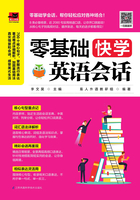
20. I want my clothes washed.
我想洗一下我的衣服。
重点解析
want/need...done意为“想要/需要……被做”,相当于...want/need to be done;也可以用作...want/need doing,以主动形式表示被动意义。
情景对话
Steven: I want my clothes washed.
Julia: I can help you with that.
史蒂文:我想洗一下我的衣服。
茱莉娅:我可以帮你洗。
相似表达
I need my clothes to be washed.
我想洗一下我的衣服。
My clothes needs washing.
我想洗一下我的衣服。
I have a large wash this week.
这个星期我有很多衣服要洗。
21. I am always blaming my daughter for not helping me with the housework.
我总是责备女儿不帮我干家务活。
重点解析
动词词组help sb with...意为“帮助某人做某事”,同义词组为help sb (to) do;而help oneself/sb (to...)表示“为自己/某人取食品/饮料,随便吃/喝……;擅自拿取……”。
情景对话
Julia: I am always blaming my daughter for not helping me with the housework.
Steven: You needn't be too strict with her.
茱莉娅:我总是责备女儿不帮我干家务活。
史蒂文:你不必对她要求太严格。
相似表达
We alternate in doing the housework.
我们轮流做家务。
Jack sometimes helps his wife with the housework.
杰克有时帮他的妻子做家务。
Susan likes to do housework than homework.
苏珊宁可做家务,也不愿做作业。
22. This dress is for everyday wear.
这条连衣裙是日常穿的。
重点解析
dress意为“连衣裙,礼服”,如evening dress就表示“晚礼服”, morning dress表示“女便服,男便服”。no dress也可以用在请帖中,用来告知收帖人“无需穿礼服”。
情景对话
Steven: Why not put on this dress?
Julia: This dress is for everyday wear.
史蒂文:为什么不穿这条连衣裙?
茱莉娅:这条连衣裙是日常穿的。
相似表达
The coat looks worn.
大衣看上去旧了。
This pair of jeans looks good.
这条牛仔裤看起来不错。
Such an outfit would be useful to my wardrobe.
在衣橱里添置一套这样的服装一定会有用的。
23. It is a bit giddy, isn't it?
稍显花哨了点儿,不是吗?
重点解析
反义疑问句是一种常用于口语的疑问句式,主要由“陈述部分 + 疑问部分”构成。疑问部分的主语和谓语动词,要与陈述部分的主语和谓语动词相对应。如果陈述部分的主语是名词词组,疑问部分要用相应的代词表示。反义疑问句的回答:“Yes + 肯定部句”或是“No + 否定部句”。
情景对话
Julia: What do you think of the coat?
Steven: It is a bit giddy, isn't it?
茱莉娅:你认为这件外套怎么样?
史蒂文:稍显花哨了点儿,不是吗?
相似表达
The dress looks nice on her, doesn't it?
她穿这条连衣裙很漂亮,不是吗?
The shirt is a little expensive, isn't it?
这件衬衫有点贵,不是吗?
She doesn't like gaudy decorations, does she?
她不喜欢廉价的装饰物,是吗?
24. I don't think it matches your shirt in color.
我觉得它和你衬衫的颜色不搭。
重点解析
match即可作及物动词也可作不及物动词,意为“(尤指颜色)与……相配;与……相符/一致/相衬”;也可以表示“与……相当/相匹敌”,用作match sb (at...)或是match up to...
情景对话
Steven: How do you like the tie?
Julia: I don't think it matches your shirt in color.
史蒂文:你觉得这条领带怎么样?
茱莉娅:我觉得它和你衬衫的颜色不搭。
相似表达
I would like to dress in purple today.
今天我要穿一身紫。
Do I look fashionable in this dress?
你觉得我穿这件女装时尚吗?
This tie matches well with that suit.
这条领带很适合那套西服。
25. Please wear the red one.
请穿红色的这件吧。
重点解析
及物动词wear表示“穿戴(衣物)”,强调穿戴的状态,而put on强调穿衣的动作;它也可以表示“佩带(饰物),留/蓄(须发)”,如wear a beard/coat/hat/ring/watch(留胡须/穿大衣/戴帽子/戴戒指/戴手表)。
情景对话
Julia: Which coat shall I wear?
Steven: Please wear the red one.
茱莉娅:我该穿哪一件外套呢?
史蒂文:请穿红色的这件吧。
相似表达
What should I wear?
我穿什么好呢?
Which one should I wear?
我穿什么好呢?
You look beautiful in jeans.
你穿牛仔裤很好看。
26. Can she dress herself yet?
她会自己穿衣服了吗?
重点解析
dress既可作及物动词也可作不及物动词,表示“穿衣”,通常用作be dressed in..., dress oneself, dress (sb) up in/as..., get dressed。
情景对话
Steven: Can she dress herself yet?
Julia: I'm afraid she cannot.
史蒂文:她会自己穿衣服了吗?
茱莉娅:恐怕不会。
相似表达
I am dressing for the party.
我在穿礼服准备去参加晚会。
Get up and dress quickly.
快起来穿衣服。
She dresses up lovely and purely.
她穿衣打扮可爱清纯。
You dress fashionably.
你的穿着真时尚!
27. She has good taste in clothes.
她在着装方面很有品味。
重点解析
taste本意为“味道,味觉”,既可作可数名词也可作不可数名词;表示“判断力,鉴赏力,审美力,欣赏力”,用作have no/little/much taste或是have good/excellent/bad taste in...
情景对话
Steven: She has good taste in clothes.
Julia: You said it.
史蒂文:她对服装很有品味。
茱莉娅:你说得对。
相似表达
She has excellent taste in clothes.
她对衣着很有鉴赏力。
She seems to be always in the best of taste.
她的穿着似乎总是很得体。
She has a taste for expensive clothes.
她喜欢昂贵的服装。
28. I wish you'd stop carping about the way I dress.
我希望你能停止对我的穿衣风格指指点点。
重点解析
carp在此作不及物动词,意为“挑剔,吹毛求疵,找茬儿”,通常用作carp (at sb) (about sth), have a carping tongue表示“言语刻薄,刻薄嘴”; carp作可数名词时,表示“鲤鱼”,其单复数形式相同。
情景对话
Steven: You should wear more suitable clothes.
Julia: I wish you'd stop carping about the way I dress.
史蒂文:你应该穿更为合适的衣服。
茱莉娅:我希望你能停止对我穿着的指指点点。
相似表达
My boss criticized my sloppy appearance.
老板批评我衣着邋遢。
She always dresses in black.
她总穿着黑衣服。
He dressed ordinarily.
他衣着普通。
29. I wish you weren't so conventional in the clothes you wear.
我真希望你穿衣不要那么保守。
重点解析
形容词conventional意为“依照惯例的;约定俗成的;因循守旧的”,可以用作表语(be conventional in...)或定语,也可以表示“(尤指武器)常规的,非核的”。
情景对话
Steven: I wish you weren't so conventional in the clothes you wear.
Julia: What is your meaning?
史蒂文:我真希望你穿衣不要那么保守。
茱莉娅:你是什么意思?
相似表达
She made some conventional remarks on clothes.
她说了些关于穿着的客套话。
She doesn't like conventional clothes.
她不喜欢老套的穿着。
She is always so conventional in her clothes.
她的穿着总是很保守。